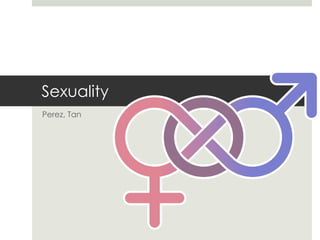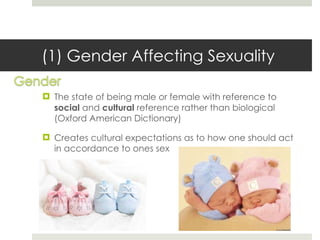Sexuality (113)
- 2. What is sexuality? (1) Distinction between female and male anatomy (2) Sexual activity But what is sex? … it is both internal and external The constitution of an individual in relation to sexual attitudes or activity. This is a broad concept that includes aspects of the physical, psychological, social, emotional, and spiritual makeup of an individual. (Miller-Keane Encyclopedia 2003)
- 3. (1) Gender Affecting Sexuality The state of being male or female with reference to social and cultural reference rather than biological (Oxford American Dictionary) Creates cultural expectations as to how one should act in accordance to ones sex
- 4. Resistance to Gender and Expansion of Sexual Preference Despite society and its culture, some people choose to act in certain ways that contradicts the expectations of society. Also, despite a predisposition for sexual preference, nowadays sexual preference (sexuality) has expanded to not only the opposite sex. Queer Gay and Lesbian Bisexual Pansexual Transgender Transvestite- crossdresser Transexual- Used to refer to people pursuing sex reassignment Aesexual- No sexual attraction
- 5. Informal Sexual Knowledge and Education
- 6. Peers (Carroll 2008) Adolescents identify peers, particularly the same gender, as the primary source of sexuality education. Many adolescence base their own self worth on peers’ approval (social gain) Problematic: inaccurate
- 7. Family/Parents (Francoeur) Studies show that when parent-educated teens do engage in sexual-intercourse, they are more likely to use an effective means of birth control. (Harvey) Effective means to convey values, not just information (Francoeur) ”Parents have expressed the following as barriers to discuss sexuality with their children: Anxiety of giving inaccurate or inappropriate information Lack of skills in communicating”
- 8. Media(Dr. Boynton) Ways the media gives information Gives the message: We are all the same So we don’t feel isolated Ex: everyone is prone to STDs, use protection! Scare Tactics So we don’t feel isolated Ex: everyone is prone to STDs and may get pregnant, don’t have sex Problem: They tell you what you must not do, but they don’t tell you what you need to do.
- 9. Ěý
- 10. Aspirational Sex Commercialization of Sex Constant quest for sex to be reinvented using products, performance, positions “ You’ve got to be good at sex” Humor Commercialization of Sex Constant quest for sex to be reinvented using products, performance, positions “ You’ve got to be good at sex”
- 11. Sources http://medical-dictionary.thefreedictionary.com/sexuality http://lgbtcenter.ucdavis.edu/lgbt-education/lgbtqia-glossary http://books.google.com.ph/books?id=EXAGIQ3iwTwC&printsec=frontcover&dq=sexuality&hl=en&ei=OjcJT-nyI8zhrAeAirHwDw&sa=X&oi=book_result&ct=book-thumbnail&redir_esc=y#v=onepage&q=sexuality&f=false http://books.google.com.ph/books?id=PQMTzc6y8ZAC&pg=PA84&dq=sexual+knowledge+peers+media+parents&hl=en&sa=X&ei=eTIMT8PBIsTptgeG9KmbBQ&redir_esc=y#v=onepage&q=sexual%20knowledge%20peers%20media%20parents&f=false http://www.youtube.com/watch?v=AqS4HfYrOIE http://books.google.com.ph/books?id=VTteXoPS2m8C&pg=PA81&dq=peers+source+sexual+knowledge&hl=en&sa=X&ei=VzQMT6L6BauTiAfMs8zpBQ&redir_esc=y#v=onepage&q=peers%20source%20sexual%20knowledge&f=false http://books.google.com.ph/books?id=UyrUuqdEEgYC&pg=PA395&dq=peers+source+sexual+knowledge&hl=en&ei=vjMMT_q5C-6hiAftz9WYBg&sa=X&oi=book_result&ct=book-thumbnail&redir_esc=y#v=onepage&q=peers%20source%20sexual%20knowledge&f=false











